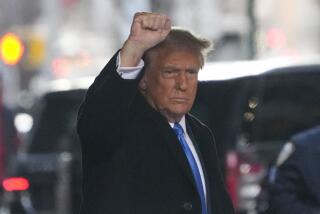Judge’s New Plight: What to Do With Kaczynski Jury
- Share via
SACRAMENTO — Even as he wrestles with the issue of Unabomber suspect Theodore Kaczynski’s mental competence, U.S. District Judge Garland E. Burrell Jr. faces another, equally tough problem: how to handle 18 jurors who now have nothing to do.
The jurors, who were painstakingly selected over more than a month starting Nov. 12, showed up twice this week at the John E. Moss Federal Building ready for duty, only to be sent home for reasons not fully revealed to them.
Outside their presence, Kaczynski tried to fire his lawyers and recruit another. In a further bizarre twist, on Thursday he asked to represent himself, after an apparent suicide attempt, fearing that his current defense team would tell jurors he is mentally ill--a label he desperately fears.
Now, the holdup casts a shadow over the future of the 12 jurors and six alternates, which Burrell alluded to in court Thursday. “Unless the trial commences,” the judge warned the lawyers, “we may be in the position where we have to start the jury selection process all over again.”
On Wednesday, Burrell rejected as untimely Kaczynski’s attempt to hire well-known San Francisco criminal defense attorney Anthony Serra.
And at a hearing Friday, the judge, citing Kaczynski’s alleged suicide attempt, emphatically ordered psychiatric tests by a U.S. Bureau of Prisons physician to determine whether the onetime UC Berkeley mathematics professor has the ability to defend himself, or even to stand trial.
The North Carolina-based psychiatrist, Dr. Sally Johnson, is scheduled to start examining Kaczynski on Monday and to issue a confidential report for Burrell by Friday. Johnson, chief of psychiatric services at the Butner Federal Correctional Institution in the town of that name, examined presidential assailant John Hinckley Jr. and led a team that evaluated televangelist Jim Bakker’s competence before his trial on fraud and conspiracy charges.
A hearing has been set for Jan. 22, and if Kaczynski is found competent the trial could begin immediately.
The halt in the trial raises legal concerns that have dogged prosecutors since Sam Shepard’s murder conviction was overturned in 1966 by the U.S. Supreme Court, which ruled that the Cleveland physician was denied a fair trial because of extensive pretrial publicity.
The jurors in the Kaczynski case have been repeatedly admonished by Burrell not to listen to, watch or read any news accounts of the trial, which has attracted media coverage from around the world. In court Friday, Burrell said he would remind jurors again to “avoid all news media accounts.”
Lead prosecutor Robert Cleary was not available for comment. But his team is presumed to be worried about whether the jurors have been tainted by the publicity about Kaczynski’s alleged mental illness and his apparent suicide attempt.
*
“If they hear about this [case] and they are polluted by the publicity, the potential of keeping this jury lessens each day,” said David Dratman, a Sacramento attorney tracking the case. If there is a long delay, Dratman said, Burrell might have no choice but to discharge the jurors and find a new panel.
A source close to the prosecution said the government believes that there is no cutoff date by which the jury would have to be dismissed.
Even if Burrell gives a green light for opening statements Jan. 22 with the current jury, the opposing parties might want to quiz the panelists again to determine if any news reports have influenced their thinking.
UCLA law professor Peter Arenella said the prosecutors are “probably quite concerned about information seeping out to the jury.” But he dismissed pretrial publicity as a major issue. “When [you] want to execute a mentally ill killer, you have to expect the unexpected,” Arenella said.
Charles Bloodgood, a veteran defense attorney in federal court in Sacramento, said Burrell has to be very concerned about the jury at this stage of the case. “He doesn’t want them sitting . . . twiddling their thumbs” for a long time, Bloodgood said.
*
Kaczynski is charged in a 10-count indictment with killing two men and injuring two academicians in bomb attacks. Authorities contend that Kaczynski, 55, is the Unabomber responsible for a string of bombings that killed a total of three people and injured 29 between 1978 and 1995.
The defendant was arrested in April at a tiny cabin near the Continental Divide in Montana and has pleaded not guilty. He has spent most of the time since his arrest at the Sacramento County Jail.
When Kaczynski arrived at court Thursday morning with a red mark on the right side of his neck, he told his attorneys that he had tried to commit suicide in his cell, a Sacramento County sheriff’s spokesman said Friday. They passed the word to the U.S. Marshals Service, the spokesman said.
“He’s doing fine. No problems,” the spokesman said of Kaczynski’s demeanor Friday. The defendant is under a 24-hour suicide watch after apparently trying to hang himself with his underwear.
At Friday’s hearing, Burrell told the jammed courtroom that he had been unaware of the alleged attempt until after Kaczynski jolted the proceedings Thursday by asking to represent himself.
Hours after the apparent suicide attempt, Kaczynski was back in court trying to represent himself, triggering an abrupt suspension of the proceedings. At one point, Burrell called the jury into the courtroom to say the delay was triggered by issues of “constitutional significance.”
“Sometimes justice does not move in accordance with the notions we have in our mind; it moves at its own pace,” the judge said. “And if it has to slow down, so be it. That’s the law.”
More to Read
Sign up for Essential California
The most important California stories and recommendations in your inbox every morning.
You may occasionally receive promotional content from the Los Angeles Times.













